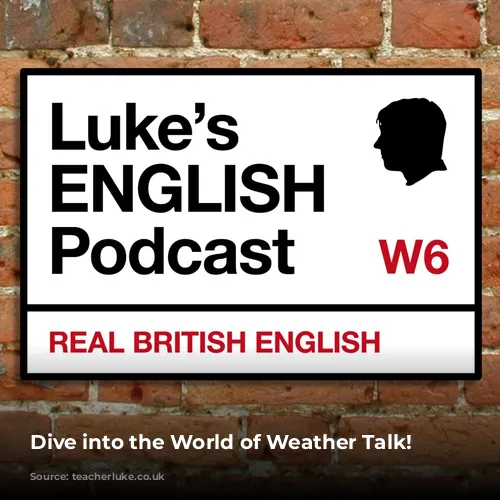Ready to chat with people from all over the world? The weather is a perfect conversation starter, and this episode is packed with the vocabulary and expressions you need to sound like a native speaker. Whether you’re discussing a blustery day or a scorching summer, you’ll be prepared to describe it all!
Learn the Lingo
This podcast delves into the fascinating world of weather, providing a treasure trove of words and phrases to enrich your vocabulary and spice up your conversations. You’ll discover the difference between a gentle breeze and a howling gale, learn how to describe drizzling rain and torrential downpours, and even master the art of talking about foggy mornings and sunny afternoons.
Practice Your Listening Skills
Don’t worry if you can’t understand every word! Listen to the episode multiple times. This is an amazing way to develop your listening comprehension, and you’ll be surprised at how much you pick up with each listen.
Remember, it’s okay to not understand everything. Focus on the main ideas and enjoy the journey!
A Guide to Weather Words
Ready to impress your friends with your knowledge of the weather? Here’s a handy list of vocabulary and explanations:
Rain:
Light rain: A gentle, barely noticeable drizzle.
* Heavy rain: A strong downpour that can leave you drenched.
* A shower: A short burst of rain, often passing quickly.
* A downpour: A heavy, intense rain that can make it difficult to see.
* It poured down: A more expressive way of saying it rained heavily.
* Drizzle: Fine, light rain that falls in small drops.
* It’s spitting: A light rain just starting, with a few scattered drops.
* Get caught in the rain:* To be caught in an unexpected rain shower.
Wind:
Windy: A day with strong gusts of wind.
* A breeze: A gentle, pleasant wind.
* A storm: A period of bad weather with strong wind, rain, and sometimes thunder and lightning.
* A gale: A strong, powerful wind.
* A hurricane/typhoon:* A powerful storm with extremely high winds. Hurricanes occur in the western Atlantic Ocean, while typhoons occur in the western Pacific Ocean.
Snow:
* Snowing: When snowflakes are falling from the sky.
* To settle: When snow lands on the ground and stays there without melting.
* A blanket of snow: A thick covering of snow on the ground.
Temperature:
* Cold: A low temperature, below what is considered comfortable.
* Chilly: A bit cold, but not freezing.
* Freezing: Very cold, often making it difficult to be outside.
* Hot: A high temperature, above what is considered comfortable.
* Mild: A pleasantly warm temperature.
* Warm: A comfortable temperature, neither too hot nor too cold.
* Boiling: Extremely hot, making it uncomfortable to be outside.
Humidity:
* Humid: Hot weather with a lot of moisture in the air.
* Muggy: A hot and humid feeling, often making it uncomfortable.
* Close: A humid feeling, making the air seem heavy.
* Sticky: A very humid feeling, making your skin feel sweaty and your clothes stick to you.
* Stuffy: A feeling of stale air, often in an enclosed space.
Clouds:
* Cloudy: The sky is covered with clouds.
* Overcast: The sky is completely covered with clouds, making it difficult to see the sun.
* Fog: Thick clouds that rest near the ground, making it difficult to see.
* Mist: A light fog, often seen in the morning or evening.
* Clear sky: A sky with no clouds.
Other Weather Terms:
* Hail: Frozen rain, often coming in small pellets.
* Sleet: A mixture of rain and snow.
* Cosy: A comfortable and warm feeling, usually indoors.
* Grey: A dull, overcast day.
* Miserable/depressing/grim: A day that makes you feel sad and unhappy.
* Draught: Cold air coming in through a window or door.
* Frost: A thin layer of ice that forms on surfaces overnight.
* Heatwave: A period of unusually hot weather.
* Thunderstorm: A storm with thunder and lightning.
* Thunder: The loud noise produced by lightning.
* Lightning: Flashes of light caused by electricity jumping between clouds and the earth.
* Mouldy: When something, usually food, is covered in mould, a fungus that grows on decaying matter.
Ready to weather the storm of conversation? Tune in to the podcast and start practicing! You’ll be surprised at how quickly you can improve your English skills while exploring the fascinating world of weather.

